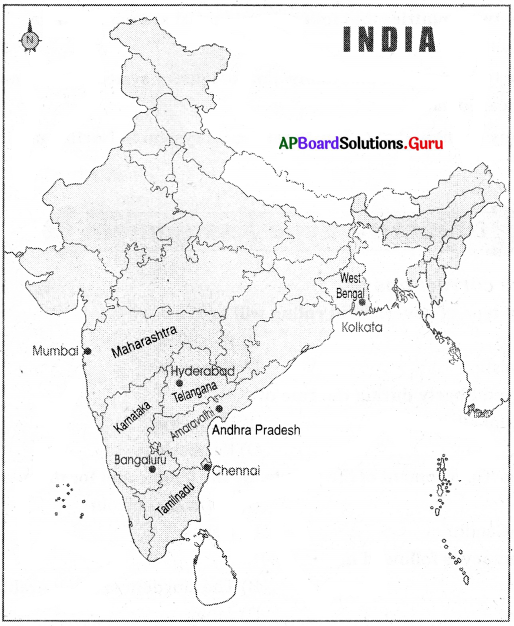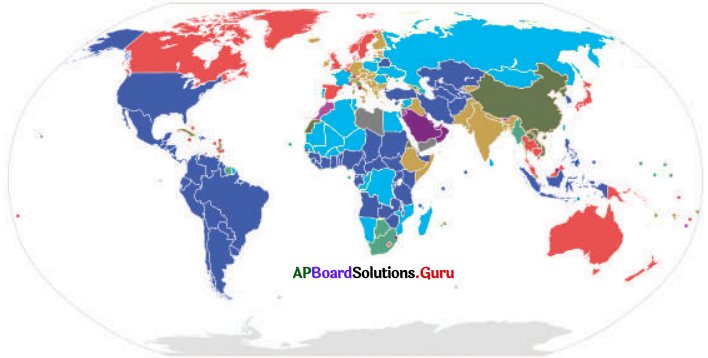These AP 6th Class Social Important Questions 9th Lesson Government will help students prepare well for the exams.
AP State Syllabus 6th Class Social Important Questions 9th Lesson Government
Question 1.
What is a government? What are the different types of government mentioned in this lesson?
Answer:
The group of people that controls and makes decisions for a country or a state is called the government. There are two types of government mentioned in this lesson.
They are:
- Monarchy and
- Democracy.
1. Monarchy: The type of government that was ruled by a king or queen is called Monarchy. A monarch comes to power by inheritance. Ex: Ashoka came into power after his father BinduSara. Citizens can have the rights and facilities depending on the monarch/king.
2. Democracy: The type of government that was run by the people is called democracy. Here every citizen can cast vote. They participate in taking decisions directly or through their representatives. Power cannot be inherited.
![]()
Question 2.
How is democracy different from monarchy?
Answer:
Democracy is a government of the people, by the people, and for the people. In a democracy, people are supreme because it is they who give the government power to rule. The government has to explain its actions and defend its decisions to the people.
In a monarchy, it is the king or queen who has the power to make decisions and run the government. The monarch may have a small group of advisors to discuss matters with, but the final decision-making power remains with the monarch. Unlike in a democracy, kings and queens do not have to explain their actions or defend the decisions they make.
Question 3.
What are the duties of the government?
Answer:
- The government ensures food and shelter for the citizens.
- Government helps the people during cyclones and floods.
- The government protects the boundaries.
Question 4.
What do you mean by representative democracy?
Answer:
Representative democracy means people participate indirectly in the decision-making process. They choose their representative through an election process. These representatives meet and make decisions for the entire population.
Question 5.
What do you mean by Universal Adult Franchise?
Answer:
Universal Adult Franchise means that all adults in the country have the right to vote.
![]()
Question 6.
In the early period who were not allowed to vote?
Answer:
Before independence women and people of some communities were not allowed to vote.
Question 7.
What is meant by the government at the local level?
Answer:
The local level government refers to governance for a village, town, or city.
Question 8.
What are the organs of the government? What are its functions?
Answer:
There are three organs of the government.
- Legislature
- Executive
- Judiciary.
Legislature: Legislature makes decisions or laws.
Executive: The executive executes the laws made by the legislature.
Judiciary: Judiciary interprets the laws.
Question 9.
What does a government do?
Answer:
In addition to making laws government organizes so many activities like building schools, hospitals, and roads, the government implements various schemes for the welfare of the people.
![]()
Question 10.
How do you understand the rule of majority? Explain with an example.
Answer:
The rule of the majority is one of the key principles in democracy. The election of the representatives is by a simple majority. The one who gets more votes, even if it is just by one vote will get elected. Most decisions of the elected representatives are validated on the same principle of the majority. If a decision is supported by more than half of the members, it will be implemented.
Example: Five friends are trying to decide which cinema they have to go whether Telugu or Hindi. Three of them opted for Telugu cinema. The remaining two friends should go to the Telugu cinema by respecting the majority of rules, though they wanted to go for a Hindi cinema.
Question 11.
How many types of democracies are there? Explain.
Answer:
There are 2 types of democracies. They are
- Direct democracy
- Indirect democracy.
1. Direct Democracy: People directly participate in decision-making. For example Switzerland. The citizens of Switzerland gather at a place and take decisions or make laws. This system is possible in Switzerland as there is less population.
2. Indirect Democracy (Representative Democracy): In this form of democracy, people participate in decision-making indirectly through their representatives. Due to a large population, most of the countries in the world including India are following indirect democracy.
Question 12.
Into how many types of indirect types of democracy can be divided? What are they?
Answer:
Basing on the relation between the legislature and executive indirect democracy can be divided into two. They are
- Parliamentary system
- Presidential system
1. Parliamentary system: In this system executive body is formed from the legislature. This executive body is responsible to the legislature. Ex: India.
2. Presidential system: In this system executive body is not formed from the legislature. So the executive body is not responsible to the legislature. Ex: USA.
![]()
Question 13.
Every state in India has a Capital city. This is the headquarters of the state government. Point out the following state capitals which are the headquarters of the state governments concerned in the given India Map.
- Bangalore (Karnataka)
- Hyderabad (Telangana)
- Chennai (Tamilnadu)
- Kolkata (West Bengal)
- Mumbai (Maharashtra)
- Amaravati (Andhra Pradesh)
Answer:

![]()
Question 14.
Observe the world map and answer the following questions.

1. Name any two countries that follow the Presidential system in Asia.
Answer:
Afghanistan, Indonesia.
2. Name any two countries that follow the Parliamentary system in Asia.
Answer:
India, Pakistan.
3. Name any two countries that follow the Presidential system in Africa.
Answer:
Nigeria, Zimbabwe.
4. Name any two countries that follow the Parliamentary system in Africa.
Answer:
South Africa, Somalia.
5. Is there any country that follows the Presidential system in North America.
Answer:
Brazil.